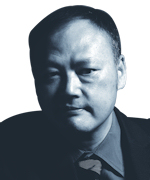HTC chief executive Peter Chou reveals why his company is targeting growth in Asia and Europe after losing ground to rivals Apple and Samsung. Barry Mansfield reports.
Samsung may have boasted the official phone of the London 2012 Olympics in the form of the Galaxy S3, but smartphone maker HTC had its time in the spotlight on the outskirts of east London, with co-founder, president and CEO Peter Chou selected to carry the Olympic flame in recognition of his achievements and success in the mobile industry.
The Burmese-born executive, a former radio and TV repairman who left for Taiwan more than 30 years ago, said he was "honoured" to carry the torch during its 70-day tour. Chou is no stranger to London life; in fact, HTC began its brand roadmap in the UK capital in 2006.
Chou returned from the Olympics determined that the company would catch up with rival Samsung. Last year, the Taiwanese firm revealed the HTC One X as the handset it was counting on to regain lost ground in that struggle. But its second-quarter financials for 2012 revealed a 26.8% drop from the company's position a year ago - and it looks unlikely that things will pick up in the third quarter.
In short, 2012 was not a particularly successful year. Chou insists that some lessons have been learned: "We have gained further experience and advancement in the areas of brand management and product innovation." He is fixed "on making things work the way it should" and believes HTC should "look beyond the tech industry" for ideas.
Optimistic outlook for HTC
HTC enjoyed a rich vein of form in 2010 and 2011, quickly growing sales amid the surge in Android demand. A confident Chou declared in April that the decline in US market share would be compensated by further growth in Asia and Europe. He was "very optimistic" that the company's fanbase would achieve greater balance as a result.
In particular, he was confident that HTC offers "the best product for the Korean consumer". Noting that "design is the core and DNA" of the company, he identified "Japan's unique culture and sense of style" as an inspiration. "Think about the fashion industry culture, beauty, colours and materials, the craftsmanship of the car industry...Creating beautiful hardware is at the heart of what HTC is about," he said.
Chou singled out China as the most likely growth engine. In a recent uncovered memo to 16,000 staff - penned by the CEO and published in August by the Wall Street Journal - Chou conceded that the company had made mistakes and emphasised the need to get back on track urgently. Taiwan's government has even raised the possibility of a bailout for HTC to protect the country's GDP.
The company readjusted its Q3 projections to between $2.3bn and $2.7bn, which would be a 23% decrease from Q2. Chou believes part of the problem is that HTC has grown too quickly over the past two years, and he also admitted that the company had some difficulty executing strategy. In his plans to help it recover, he dictated a need to focus on the HTC One brand and cut bureaucracy. He also said that those in charge lack decisiveness, direction or a sense of urgency, and that he hoped to improve communication.
However, despite the apparently regretful tone of Chou's memo, he made sure to reiterate that the firm was performing well financially. He added in June that HTC is wary of destroying its brand by offering smartphones that can hurt its image, and that it would in future place a stronger emphasis on "better materials" and products that offer "premium experience".
Whether the memo will give HTC employees a much-needed confidence boost remains to be seen, but it's clear that those in charge still have faith that the company can reverse its misfortune. The mission is to increase market share in China by 2-3% and become the country's second-biggest smartphone manufacturer by 2015, despite currently lagging back in ninth place behind the likes of Samsung, Huawei and ZTE.
Ray Yam, head of HTC's China operations, told the Wall Street Journal that the company aims to compete with Apple and Samsung in China by shifting its One series handsets at similar price points and in similar quantities. To achieve this goal, it will ramp up its Chinese engineering teams and create more branded sales counters across the country, with Yam saying that HTC will look to increase branded counters from 2,700 to 3,500 by the end of 2013 (by contrast, Samsung operates 6,000).
Focus on innovation
HTC has reiterated its plans to focus on fewer new devices, a strategy similar to that adopted by also floundering Motorola. Chou has noted that taking photos is the second most popular feature of phones (after making calls) and says he wants the HTC One to be good enough to replace the standard camera.
The One - released in the UK in early April 2012 - boasts improved software and optics, and a custom image-processing chip. Among its camera features, the HTC One X can take video and shoot pictures at the same time. The camera can autofocus in 0.2 seconds and can keep taking pictures as long as you hold down the shutter.
The company will look to build on this in the second half of the year with its quad-core S4 Snapdragon Pro-powered handsets, with Android Jelly Bean and the new Windows Phone 8 arsenal, which was unveiled in New York in mid-September.
HTC has integrated Dropbox into its HTC Sense software, with 25GB of storage included for two years, which is enough to store 10,000 images. Chou promises improved sound and music management, as well, and he is emphasising the contrast between HTC and other companies such as Samsung and Sony, noting that its Media Link software works with any brand, whereas rivals focus on direct ties with their own televisions.
HTC transformed
Chou set up HTC in 1997 with Cher Wang and HT Cho (who both remain as chairman and director of the board, respectively) and the company's global operations are still based in Taoyuan City, in north-western Taiwan.
He has overseen HTC's transformation from a contract handset manufacturer into a smartphone powerhouse thanks to the very early, savvy bet he made on Google's Android mobile operating system.
However, that same bet has brought a great deal of hassle as well, most notably a high-profile lawsuit from Apple alleging that a number of HTC's Android devices infringe patents related to the iPhone's graphical user interface, underlying architecture and hardware.
Apple won its suit against HTC in December 2011, when the US International Trade Commission (ITC) issued a limited exclusion order against HTC and two of its subsidiaries.
The ITC determined that a function allowing users to make calls or send emails simply by tapping a phone number or email address within text was in violation of Apple's patents. HTC was ordered to alter the functionality by mid-April. "Many lawsuits nowadays are results of being successful; it's part of the business," Chou said at the time.
Despite the company's insistence that legal battles with Apple wouldn't affect consumers, the Taiwanese company's Android smartphones, the HTC One X and EVO 4G LTE, were blocked from entering the country by US customs in May. HTC is already paying licensing fees to Microsoft due to a previous suit centred on other Android features. Chou is determined that the company will return with a vengeance, though.
"We're bringing a new focus and energy to everything," he insists. Recognising that the handset is "becoming our most intimate device", he believes the early part of this decade is "just the beginning of the smartphone era" and that your smartphone "will soon become your electronic wallet."
His vision is that 4G "will supercharge the mobile experience... The new 4G networks will turn your smartphone into a cloud-powered entertainment centre."
HTC in the cloud
HTC has already developed a global cloud-based video service called HTC Sense, which brings a "rich immersive experience", as Chou puts it. He is also excited about video games, which he says are on the cusp of "a new frontier" thanks to mobile. "Innovations like OnLive show why people are so enthusiastic," he says.
HTC has also been in the news recently due to a petition posted on Change.org asking for an alteration to the company's policy on releasing kernel source code.
The petition - featuring a picture of HTC captioned "quietly failing" in reference to its "quietly brilliant" slogan - states that while developers are grateful for the manufacturer releasing unlock codes, not releasing a source code for anything up to 120 days isn't good enough.
In the past, Chou has described developers as "a critical part of the ecosystem" and that HTC understands their needs "because we are developers ourselves", so he will need to back up this sentiment and take action here.


